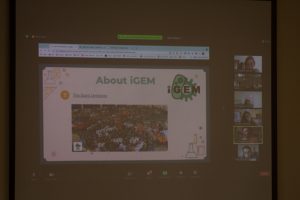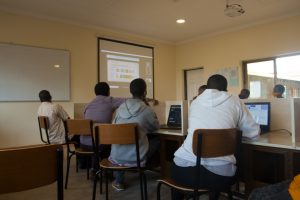

CAPPA was delighted to become part of the inaugural MTU International Genetically Engineered Machine (iGEM) competition team. The iGEM Foundation is an independent, non-profit organization dedicated to the advancement of synthetic biology community and the premiere synthetic biology competition for both university and high school level students, and the development of an open community and collaboration. iGEM inspires learning and innovation in synthetic biology through education, competition and by maintaining an open library of standard biological parts, the Registry of Standard Biological Parts. iGEM began in January 2003 with a month-long course during MIT’s Independent Activities Period (IAP) where students designed biological systems to make cells blink. This university design course then grew to a summer competition with five teams in 2004. The iGEM competition aims to empower teams to address global and local challenges, engaging local communities in synthetic biology and fostering the creation of synthetic biology ecosystems around the globe.
MTU has recently put together a student team for the prestigious worldwide iGEM competition. iGEM – MTU is the only Irish team participating this year with 350 teams worldwide registered. This is the first iGEM team from MTU. This is a multidisciplinary project and combines departments from both Cork and Kerry campuses with five staff members from CAPPA involved. iGEM – MTU has 11 students involved from various departments across both Tralee and Cork campuses from biological sciences, computer science, sports, veterinary science, biomedical engineering and mechanical engineering are part of this exciting journey. The team is working on a novel way to facilitate bioremediation on Mars and polluted sites on earth. Mars holds great interest to humanity and commercial applications alike due to its stability for potential habitation. One issue withstanding are the components of the planets soil that contains toxic levels of sodium perchlorate making growth of food impossible. The iGEM MTU team has devised a solution by engineering E.coli with genomic islands from A. suilum which breakdown the sodium perchlorate in the soil through enzymes Perchlorate reductase and Chlorite dismutase. The bacteria is housed within a 3D printed, novel, spherical design allowing biofilm formation, bacterial proliferation, enzyme distribution and addition of a seed for bioremediating and cultivating the Martian soil.
On 2 June 2021, iGEM – MTU hosted their first event. Five MTU students participated in a fantastic education and outreach event to discuss and interact with students of Agahozo-Shalom Youth Village (ASYV) in Rwanda, focusing on synthetic biology and how to solve local problems in Africa using synthetic biology. ASYV is a high school and youth village for vulnerable teenagers from all over Rwanda. ASYV provides a home and community that is more so considered family to those living there. It has provided a sanctuary for those orphaned by the Rwanda genocide and has provided a schooling system to help further educate the children on the likes of biology and engineering. The goal of this event is to lead a synthetic biology virtual club at the Agahozo-Shalom Youth Village (ASYV) in Rwanda. This event was organized in collaboration with student teams in Israel, Canada, Austria and Ireland. The MTU iGEM project is supported also by several local industries, by a no of departments in the school of science on the Cork campus and by the school of science in MTU Kerry.
You can learn more about CAPPA’s outreach activities here and more about the iGEM foundation here.


